Hong Kong
On July 1, 1997, the People's Republic of China resumed the exercise of sovereignty over Hong Kong. To maintain national unity and territorial integrity and Hong Kong's prosperity and stability, the Chinese government, in accordance with the “one country, two systems” policy and provisions of the Constitution, set up the Hong Kong Special Administrative Region (HKSAR). The HKSAR bases all its institutional setup, including the legal structure, on the Basic Law of the HKSAR.
According to the Basic Law of the HKSAR and other laws of Hong Kong, the judicial organ of the HKSAR consists of courts at all levels that exercise judicial powers and other bodies such as the Department of Justice that exercise prosecution powers.
1. Court system
Grassroots courts: district courts, magistrates' courts and special courts;
High courts: Court of Appeal and the Court of First Instance;
Court of Final Appeal
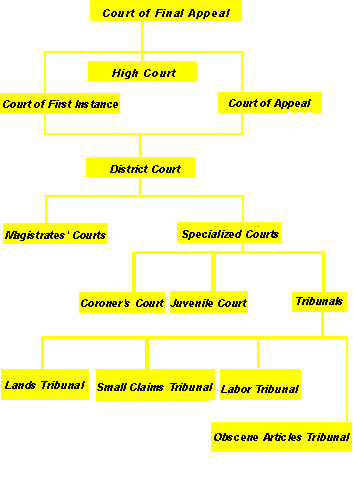
Note: Sources from Xiong Xianjue, New Views on China’s Judiciary and Its System, China Legal Press, 1998.
Hong Kong has four district courts that adjudicate civil and criminal cases within their jurisdiction. In addition, it has nine Magistrates' Courts that are the primary courts for criminal cases. The High Court exercises judicial powers on civil and criminal cases, while the Court of Final Appeal exercises the final judicial power.
2. Prosecution
Article 63 of the Basic Law of the HKSAR states, “The Department of Justice of the HKSAR controls criminal prosecutions, free from any interference." The Department of Justice is the largest legal institution in Hong Kong, a unique, complicated and diversified department. Its responsibilities involve legislation, judicial administration, prosecution, civil representation, legal and policy drafting and reform, and the legal profession. In terms of nature and mission, it is similar to the US Department of Justice.
The Department of Justice as the prosecution, aside from prosecuting criminal cases in Hong Kong, also appears in court on behalf of the government in all civil (including administrative) lawsuits against the government. As the protector of public interests, it can apply for a judicial review; it can also appear in court on behalf of public interests to participate in the trial of cases that involve material public interests. It also informs courts of acts of contempt of court and assist courts in its operations. The attorney general is the legal counsel to the HKSAR government and the Chief Executive. In a word, except for judicial power, the Department of Justice almost handles everything else.
Macao
On December 20, 1999, the Chinese government resumed exercise of sovereignty over Macao and the Macao Special Administrative Region (MSAR) was established. According to the Basic Law of the MSAR, MSAR practices a high degree of autonomy and exercises independent judicial and final-appeal powers. This constitutes the cornerstone of the judiciary of the MSAR.
1. Court System
The MSAR has a three-tier court system: lower, intermediate and final-appeal courts. There is no district court because of the limited geographical size of the region. There are, therefore, few special courts; only administrative courts are created.
Lower courts
Lower courts in the MSAR are first-instance courts which, depending on needs, can have special tribunals for criminal, civil or economic cases.
Intermediate courts
These courts exercise part of the powers that used to be exercised by the High Court before Macao's return to China.
Administrative courts
These are special courts for handling administrative, taxation and customs cases and they are lower courts. Litigants who object to their ruling can appeal to intermediate courts.
Final-appeal court
As the name indicates, the final-appeal court exercises the power of final adjudication.
2. Prosecution
The MSAR's prosecution exercises the following nine powers:
Participate in lawsuits on behalf of the Macao region, municipal government and persons with legal disabilities;
Bring criminal actions and appear in courts in support of public prosecution during trials of criminal cases;
Maintain judicial independence and enforce court rulings;
Represent laborers and their dependents in courts;
Lead criminal investigations and supervise the police;
Prevent crimes and participate in lawsuits involving bankruptcy and public interests;
Provide legal counseling to the Governor (Chief Executive);
Protest undue rulings of courts;
Exercise other powers as granted by law
The prosecution of the MSAR is an independent body. It enjoys a status similar to the Supreme People's Procuratorate of the People's Republic of China, but there is a major difference between the two: the Chief Prosecutor of the MSAR's prosecution is nominated by the Chief Executive and appointed by the central government; the prosecutors are appointed and removed by the Chief Executive. Therefore, the MSAR prosecution is under strict scrutiny and supervision of the Chief Executive.
Taiwan
The “central government” in Taiwan has established five "Yuan" (house) for executive, legislative, judicial, impeachment and examination affairs.
The “Judicial Yuan” has a unique position in the government. It has a “president” and a “vice president,” a secretary general and a deputy secretary. The “Judicial Yuan” has a panel of 17 justices. It consists of common courts, administrative courts, public-servants disciplinary committee and various other committees. The “Judicial Yuan” exercises wide-ranging powers, including civil, criminal and administrative judicial powers, public-servants disciplinary powers and the power to interpret the “Constitution” and laws. In addition, the various committees under the “Judicial Yuan” also exercise their own powers.
Organizational Chart of the “Judicial Yuan”
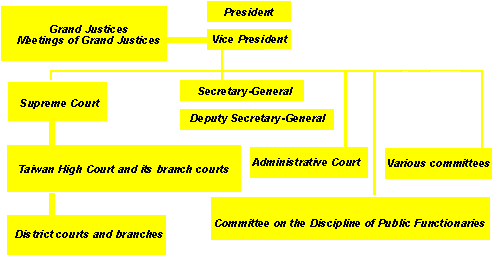
The “Ministry of Justice” is subordinate to the “Executive Yuan” in charge of administrative affairs related to prosecution, prison management and judicial protection, as well as legal affairs of the “Executive Yuan.” The “Minister of Justice” oversees the operation of the ministry and prison management. There is an “executive minister” and an “assistant minister” under the “minister.”
Organizational Chart of “Ministry of Justice”
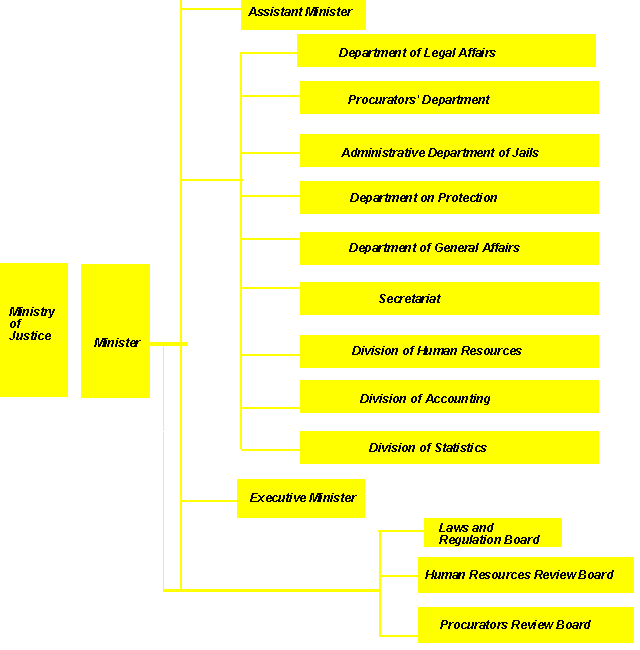
Organizations Affiliated to the “Ministry of Justice”
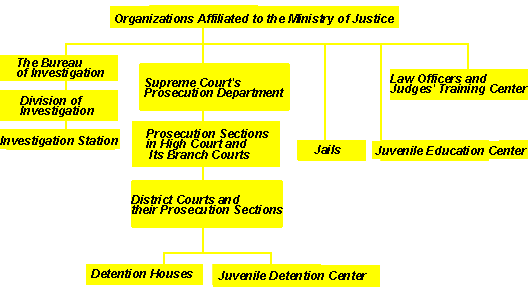
1. Court system
Taiwan has a three-tier court system: Supreme Court, High Courts, and District Courts. Their interrelationship is of a judicial rather than a hierarchical nature.
Supreme Court
The Supreme Court is the highest judicial organ in Taiwan and the court of final appeal. It has five civil tribunals and five criminal tribunals.
High Courts
High Courts are established in the provinces or special regions and represent the second tier of Taiwan's court system. Each High Court has several tribunals for civil and criminal trials. Each tribunal has a presiding judge and two judges. Special courts may also be set up. Other institutions include a public prosecutor, criminal archive center and clerks.
District Courts
These courts, the lowest in the court system, are set up in counties or cities. If the county or city is small, a court may be set up for several counties or cities; on the other hand, if the county or city is too large, branch courts may be set up. Local courts are usually presided over solely by one judge. Cases of major proportion are presided over by a panel of three judges.
Chart of Courts at Various Levels and Their Major Responsibilities
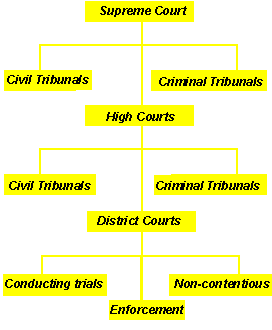
2. Prosecution System
Taiwan has a three-tier prosecution system: the Supreme Court's Prosecution Department, High Courts' Prosecution Division and District Courts' Prosecution Section. All belong to the “Ministry of Justice,” which, in turn, is under the “Executive Yuan.”
Prosecution Department of the Supreme Court
This department consists of one prosecutor-general and a number of prosecutors. The prosecutor-general oversees prosecution affairs, and implements programs and drafts work plans.
Prosecution Divisions of High Courts
Each division has a chief prosecutor and several prosecutors.
Prosecution Sections of District Courts
Like their higher counterparts, each of these sections has a chief prosecutor and a number of prosecutors, with the chief prosecutor responsible for supervising prosecution affairs of that court, disciplining court staff, and evaluating their performance.